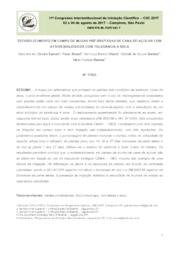Estabelecimento em campo de mudas pré-brotadas de cana-de-açúcar com ativos biológicos com tolerância a seca.
Estabelecimento em campo de mudas pré-brotadas de cana-de-açúcar com ativos biológicos com tolerância a seca.
Summary: A busca por alternativas que protejam as plantas sob condições de estresse, como de seca, é uma tendência global. Neste sentido, pesquisas com o uso de microrganismos associados com plantas estão cada vez mais constantes, sendo foco deste trabalho, que objetivou testar o estabelecimento em campo de mudas pré-brotadas de cana-de-açúcar com a inoculação de um ativo biológico de tolerância à seca. O delineamento experimental foi inteiramente ao acaso, em esquema fatorial triplo 2x2x2 sendo duas variedades (RB 855156 e IAC 911099), dois inoculantes (testemunha com água e inoculante com a bactéria CMAA ? 1363), combinados com dois regimes de irrigação em campo (com e sem irrigação pós estabelecimento), com três repetições. Os parâmetros avaliados foram: a porcentagem de plantas murchas e mortas; índice de velocidade de murcha; altura (cm) e diâmetro de plantas (mm) aos 10, 20 e 27 dias; biomassa da parte aérea e da raiz (g planta-1) aos 27 dias. Utilizou-se a análise de variância e teste Tukey de médias. Os resultados permitem concluir que: o estabelecimento em campo de mudas de cana-de-açúcar não se altera em função do uso de inoculante biológico CMAA ? 1363, mesmo sob restrição de uma lâmina de irrigação. Há diferenças na altura e na biomassa de plantas em função da variedade estudadas, sendo a IAC-911099 superior em altura e biomassa de raiz e a RB-855156 superior na biomassa da parte aérea. A presença da irrigação retardou a velocidade de murcha de ambas as variedades estudadas. The search for alternatives that protect plants under stress conditions, such as drought, is a global trend. Based on this premise, researchs with the use of microorganisms associated with plants are increasingly constant, being the focus of this work, which aimed to test the establishment in the field of pre-budded sugarcane seedlings with an inoculation of a microorganism tolerant to drought. The experimental design was completely randomized, in a 2x2x2 triple factorial scheme, two sugarcane varieties (RB 855156 and IAC 911099), two inoculant treatments (control with water and inoculant with the bacterium CMAA - 1363), two irrigation systems in the field (with and without irrigation), and three replications. The establishment of the plants in the field, was verified by evaluating: the percentage of wilted and dead plants; wilt rate index; plant height (cm) at 10, 20 and 27 days; plant diameter (mm) at 10, 20 and 27 days; biomass of the aerial part and of the root (g plant-1). The analysis of variance was used, with means analyzed by Tukey test using the Sisvar software 5.6. The results allow to conclude that: the field establishment of sugarcane seedlings do not change due to the use of biological inoculant CMAA - 1363, even under restriction of an irrigation blade. There are differences in plant height and biomass depending on the variety studied. The IAC-911099 had higher height and root biomass and RB855156 higher shoot biomass. The presence of irrigation delayed the wilt rate of both varieties studied.
Publication year: 2017
Types of publication: Paper in annals and proceedings
Unit: Embrapa Environment
Observation
Some of Embrapa's publications are published as ePub files. To read them, use or download one of the following free software options to your computer or mobile device. Android: Google Play Books; IOS: iBooks; Windows and Linux: Calibre.
Access other publications
Access the Agricultural Research Database (BDPA) to consult Embrapa's full library collection and records.
Visit Embrapa Bookstore to purchase books and other publications sold by Embrapa.

